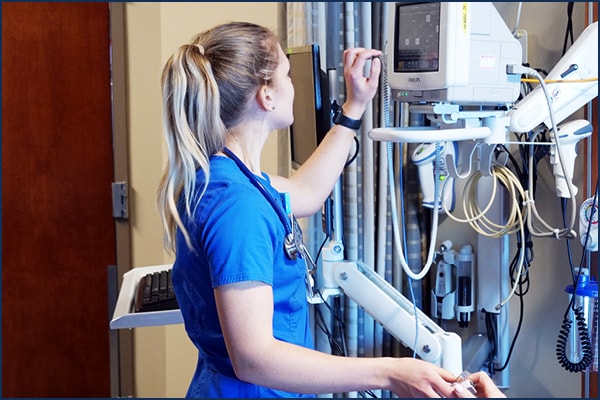Dickinson State University (DSU) announced that both of its nursing programs, the Associate of Applied Science in Practical Nursing (AASPN) and the Bachelor of Science in Nursing (BSN), have been granted continuing full accreditation by the Accreditation Commission for Education in Nursing (ACEN). The recognition underscores DSU’s commitment to excellence in nursing education and reflects the university’s readiness to meet the evolving healthcare needs across the region.
The practical nursing program earned continuing accreditation with removal of conditions, with the next evaluation visit scheduled for fall 2031. The baccalaureate nursing program received continuing accreditation with removal of good cause, and its next evaluation visit is set for fall 2029.
“These outcomes are a testament to the dedication, rigor, and quality of our DSU nursing faculty, staff, and students,” said Co-Director Carey Haugen. “Accreditation by ACEN is a rigorous and thorough process. It affirms that our programs meet national standards, and it empowers our graduates to practice with confidence statewide and beyond.”
Co-Director Collette Christoffers added, “We are extremely proud of this achievement. It took over a year of planning, continuous improvement, and collaboration with clinical partners. Our accreditation status strengthens DSU’s position as a key contributor to the nursing workforce in North Dakota and the surrounding area.”
DSU leaders also praised the milestone. “This full accreditation is a major win for DSU and for our region,” said DSU President Scott Molander. “It reflects our institutional commitment to high-quality health professions education, and it positions DSU to expand nursing capacity even further in the coming years.”
“DSU’s nursing success aligns squarely with the university’s academic mission of serving our rural communities,” said Holly Gruhlke, vice president for academic affairs and provost. “With this accreditation in hand, we will move forward to innovate, grow, and strengthen our nursing offerings. We are so grateful to our talented nursing administrators and faculty for their hard work and dedication to our students.”
Growth and Innovation Ahead
With accreditation secured, DSU is preparing to expand its nursing education pathways. The university plans to open seats in its Licensed Practical Nursing program this spring to provide a shorter route into the profession for students and to meet the needs of health care facilities seeking practical nursing staff. In addition, DSU plans to launch a traditional four-year BSN program in fall 2026 aimed at students entering directly from high school or other academic tracks.
These initiatives will be supported by a fully staffed faculty of highly qualified educators, many with advanced credentials, extensive clinical experience, and strong ties to health care providers throughout the region.
Meeting Workforce Needs
DSU’s accreditation achievement comes at a time of heightened need for qualified nurses nationwide and across rural communities. The U.S. Bureau of Labor Statistics projects about 189,100 openings for registered nurses each year over the next decade, driven largely by retirements and workforce turnover. The Health Resources and Services Administration anticipates a 10% shortage of registered nurses nationally by 2027, with shortages in licensed practical nurses projected to continue through 2037.
In North Dakota, while the state historically has had more nurses per capita than the national average, it recorded a net loss of 313 licensed nurses between 2022 and 2024, according to the University of North Dakota’s College of Nursing & Professional Disciplines 2025 biennial workforce report. Rural and semi-rural hospitals across the state have reported registered nurse vacancy rates exceeding 12%, according to data compiled by the North Dakota Center for Nursing and the North Dakota Office of Rural Health.
The healthcare workforce trends underscore the importance of robust, regionally focused nursing programs, such as those at DSU. DSU’s distinction as a Dual Mission Institution helps guide programs that directly contribute to bridging workforce gaps, thereby supplying competent graduates who can serve in rural areas and enhance health outcomes in these communities.

